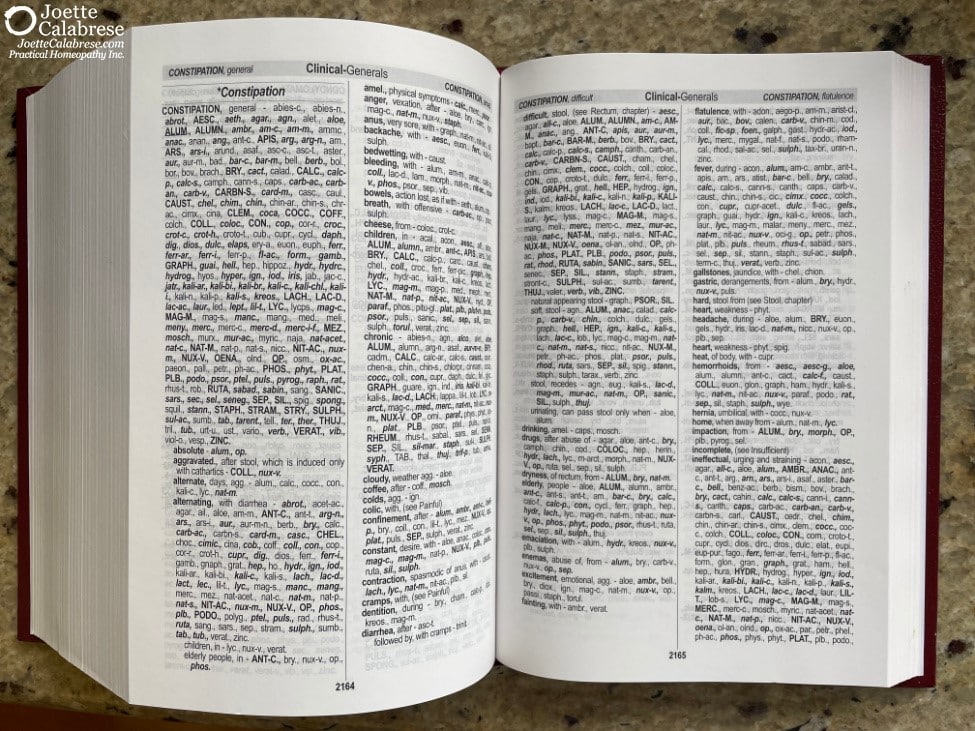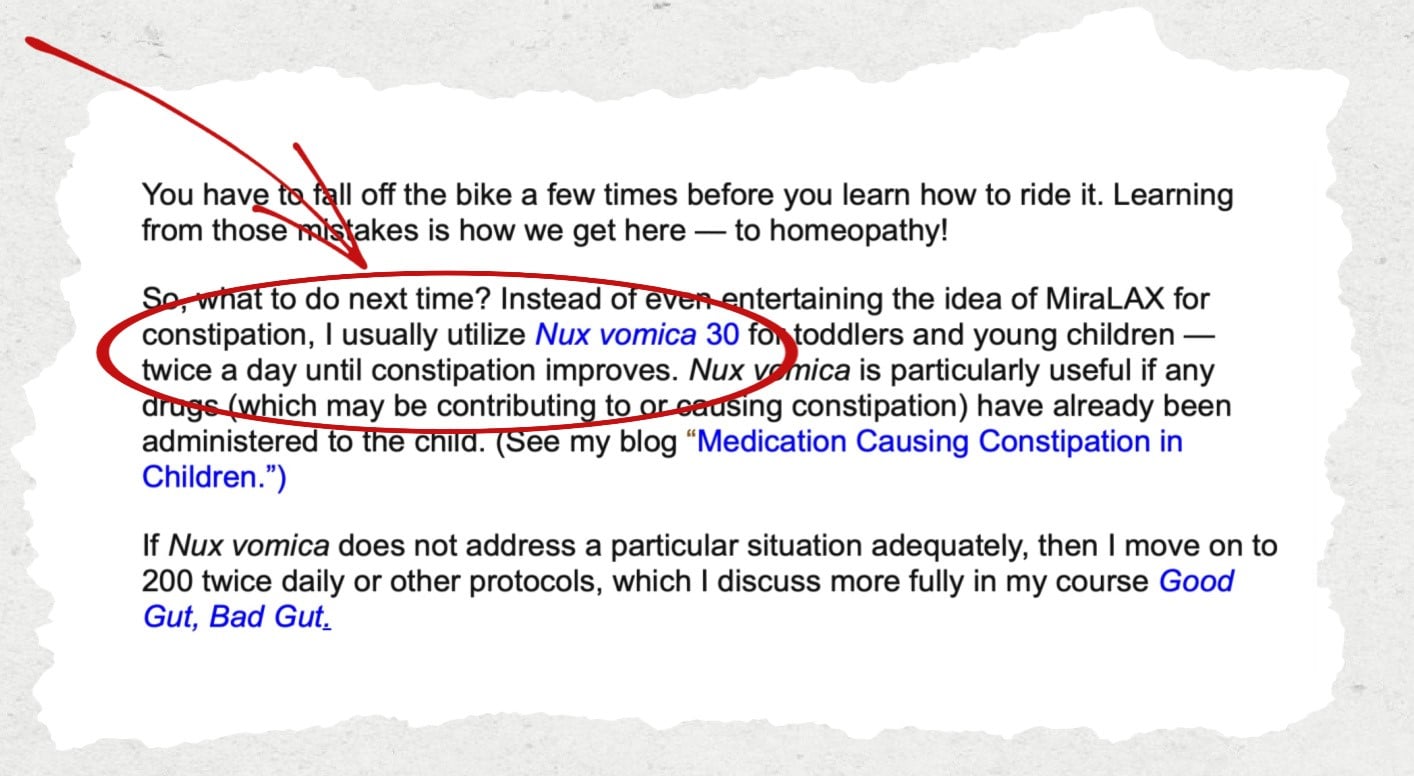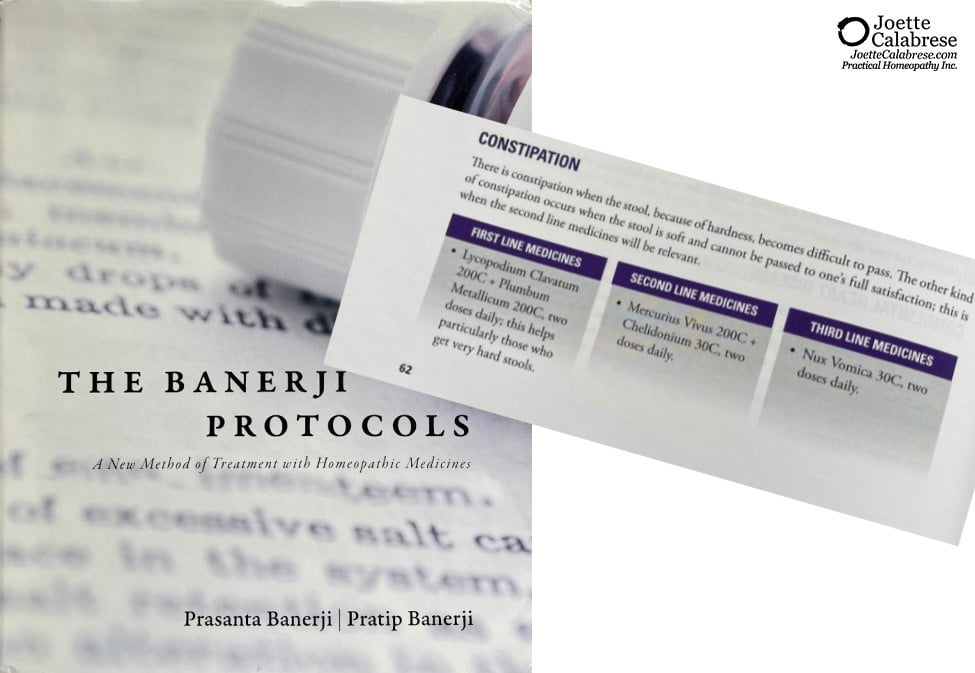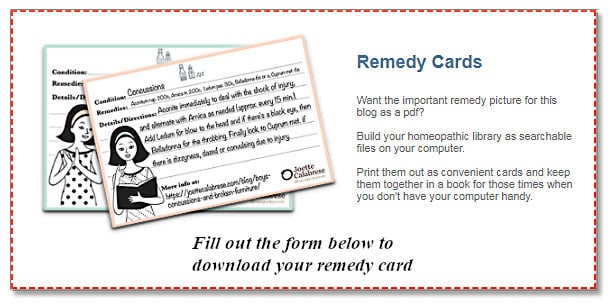I'm regularly asked if I can direct someone to a book that has the name of all conditions and which medicine to use for each.
Why, yes! Yes, I can. But are you sure that’s what you want?
Before you make your decision, let me give you some background.
Since 1805, homeopathic repertories are the books in which that information has been collected and organized. These books have been through many incarnations and written by many different homeopaths. The internet offers a few free repertories online from such storied homeopaths as Kent and Boericke.
However, in my opinion, a recent publication stands out among the rest. “Robin Murphy’s MetaRepertory, Fourth Edition” is a masterpiece. (I’ve linked here to Robin Murphy’s website because after seeing the current price Amazon is asking as of this writing — double the usual retail price — I almost needed Aconite for shock!)
Murphy’s “MetaRepertory” is a compilation of all historical and recent homeopathic practitioners’ provings and clinical evidence culled from prior repertories. Plus, it incorporates thousands of new conditions and rubrics and the associated homeopathic medicines to be considered.
Even though Dr. Murphy created his repertory to be more modern and clinically easier to use than the older repertories, it is still a complicated book! While it is an undoubtedly exciting book, it can also be painfully difficult to slog through the detailed, extraordinarily in-depth listings.
Let’s face it, “MetaRepertory” is over 2,600 pages of ultra-thin Bible paper! Can you imagine how huge this book would be if it were printed on regular paper? It would resemble a set of encyclopedias!
Let’s look at a common condition as an example — constipation.
If you don’t own Murphy’s “MetaRepertory,” take a look at this photo from page 2164.
Just look at that repertory page, will you? There are over 200 different homeopathic medicines within the initial general section of constipation alone — and that’s before the individual rubrics begin. The remedy possibilities continue for 4 ¼ pages in total!
So, how does one pick between all these possible choices? Why, by owning a materia medica as well — generally, another massive tome in which to look up each of the suggested medicines and consider their keynotes before making a final decision on the best fitting medicine.
Do you have all day?
Prior to the Banerji Protocols, this is exactly what each homeopath was expected to wade through before determining the appropriate medicine for each sufferer. And that’s not even the end of it. After eventually choosing the proper medicine, then the homeopath would need to figure out the proper potency and frequency!
Do you see how difficult, remote, recherché or elite homeopathy might seem to the average individual?
Homeopaths who don’t use the protocols must still trudge through their repertories. But what the Banerjis have created — and what I am giving to you — is a distillation of this vast amount of information so that you don’t have to wade through it all!
I’m sure you can more fully appreciate why it was worth my going to India for eight years to learn protocols at the side of the Drs. Banerji.
So, now, instead of considering the 200+ potential medicines listed for constipation, I simply teach, “For constipation, consider Nux vomica 30 twice daily, until the condition is resolved. To address hard, reluctant stools, consider Lycopodium 200 mixed with Plumbum metallicum 200, twice daily until stools return to normal.”
That’s it — the end. We’re done. (And many times the constipation will be done, too! These protocols work!)
Folks, I am trying to make homeopathy more accessible to the masses so that families across the globe are not forced to sink into a quagmire of complexity.
I’m going as fast as I possibly can to get information about Practical Homeopathy® into the hands of the public. I honestly can’t go any faster to get these protocols out there!
So, rather than researching endlessly in a repertory, the fastest and easiest way I know for individuals to learn which medicine applies to which condition is through my blog posts and my courses.
Consider my blog posts to be your first stop — your “Remedy Reference Guide.” Going back to our example, let’s search for “constipation” on my website. I’ve discussed the topic several times, so there are several blog posts and podcasts for you to choose from. But let’s look at one entry from the article The MiraLAX Blues.
Now, isn’t that easier than wading through the repertory?
If you want to learn more about any particular health topic, you can purchase a more in-depth course. Using our example, I cover constipation in Good Gut, Bad Gut particularly if the protocols I discuss here don't act fully. For a different condition, use my Course Selector to determine which course would be right for you.
Lastly, if you want to go straight to the masters, own a copy of “The Banerji Protocols” by Drs. Prasanta Banerji and Pratip Banerji. Keeping with our example, here is their entry for constipation.
Wouldn’t you say that’s much more straightforward than the repertory page?
However, I do urge you to read the book! Please don’t simply use “The Banerji Protocols” as a shortcut to “finding the remedy” without reading the extremely valuable information in the book's written chapters — especially in the Background section.
A word of concern that I would like to share out of an abundance of caution. A version of the book purchased from Amazon was reported to me as being counterfeit. Because I don’t have a connection to any of the marketplaces that sell “The Banerji Protocols,” I cannot give assurances as to whether any particular source is legitimate or not. So, instead, let me give you this warning: If the price seems too good to believe, it is most likely a counterfeit book.
I encourage you to check the reputation of the third-party seller (should you choose to buy the book from Amazon) or purchase from another source that you know you can trust.
So, let’s sum this up, shall we? For years, when I practiced as a classical homeopath, I slogged through all these potential medicines contained in the repertory. But now, thanks to the Banerjis and years of clinical experience, you have access to resources that don’t require hours and hours, a magnifying glass, and plenty of trial and error! Instead, utilize my blog, in-depth courses, and “The Banerji Protocols” to learn the most appropriate medicine for most common conditions.
If homeopathy becomes your passion, then you may certainly consider Robin Murphy’s “MetaRepertory” as an erudite addition to your library.
As always, pass on the good news of homeopathy … by sharing my easy-to-understand blog posts!
Warmly,
P.S. My Mighty Members’ private website is an abundant source of additional information I post each week — as well as an enjoyable place for you to share freely with like-minded people without the prying eyes of Facebook.
And remember — all my Mighties qualify for a 10% discount on course purchases. If you need assistance getting your discount, email [email protected] for more information.









Thank you, Joette! I bought both of Murphy’s MetaRepertory and Nature’s Materia Medica, 4th edtions. (What can I say? I’m a research nerd and rather than intimidate me, these masterpieces excite me!). But I’m also really still a beginner with homeopathy and have taken the Good Gut, Bad Gut course. One of my cats has the constipation you describe of hard, reluctant stools. I tried Nux vomica 30, water dosed, and it didn’t work for her. I have both Lycopodium and Plumbum met in 200c. Is that too strong a potency for a cat? Thanks again!
Using these protocols we don’t adjust for age, size, etc. We use the protocols exactly as they’re written.
P.S.’Love homeopathy nerds.
Thank you!
Hi Joette,
I had purchased the book from Amazon awhile ago, not knowing it could be bootlegged. Can you tell me a couple of things to look for in it to know if the copy I got was genuine so I don’t spend money on a new copy needlessly? (plus, I don’t see a link to purchase it from your link, just a description) The Amazon listing doesn’t have any reviews that say it’s bootleg. Also, I had gotten another volume called “Additional Banerji Protocols from the Clinic” from Amazon at the same time. Do you know if this is also bootleg? Thanks!
The real version has a hologram on page IV.
Hi Joette – I guess mine is a bootleg. What is wrong with it precisely? Is it unusable? Like so many here, I spent good money because the reviews on Amazon were good and I didn’t see anywhere else to buy it (there doesn’t appear to be a way on the Banerji website). Also, is the other book I mentioned not one of their books? And how can we buy a real copy if the bootleg isn’t usable? Can you do another post on this? A lot of us are so frustrated. Thanks!
I have both books too, Becky. I bought mine from Amazon a while ago. Had no idea. So frustrated
There seem to be a lot of us in this boat!
Shucks, my copy is without the hologram! Do we know any further problems with the bootlegged version, like incorrect protocols and missing pages? I’m so sad, I’ve been wanting this book for years and finally got it for Christmas!!
How can I tell if my Banerji Protocols is the real deal or bootlegged?
The real version has a hologram on page 1V.
For others with the Amazon book, can you reply if you are seeing the same as I am: I don’t have a formally marked “IV” and the page before page V is the copyright page and disclaimer. I don’t see a hologram on any of the initial pages.
My copy has the dedication on page V. The disclaimer and copyright/publishing information are on the facing page. “Copyright 2013. Reprinted on [sic] 2019.” ISBN 978-93-80813-21-9
Neither has a hologram. But mine came from India – whether from the Banerji clinic or somewhere else, I don’t know.
It would be helpful to know what is wrong or missing in the bootleg version so I can modify it. I spent birthday money and can’t replace it.
Same here. I have the first book and the additional protocols book.
I bought my book off of Amazon, and on the page prior to V is the copyright page and disclaimer. It DOES have an iridiscent round sticker with the Banerji Protocols imprint and logo on that page, though. Mine also has a sticker with the “Jain Book Depot Delhi” on the bottom of the page, who was the listed seller.
I just bought my book 2-3 weeks ago from Amazon. I also do not have a “page IV.” The page before page V is just the copyright page. This is very disappointing. I wonder if Amazon will take returns on this.
Looks like I got taken, too. I bought mine on Amazon in December 2020 from a company called Frozen Book Hub, registered to a man with an Indian name with a New Jersey address for $52. At the time I didn’t look any of this up because it didn’t occur to me that it might be an illegal copy. Like yours, there is no Page IV and no hologram. Now I’m wondering whether all the protocols are there. It is hardbound with a black cover with gold leaf and a glossy paper jacket with color Banerji photos on the back. It has 176 pages. When I first heard about the fakes, someone said if it has 176 pages it’s legitimate. They didn’t mention holograms. Now I’m wondering if mine has all the protocols and whether the ones I do have are correct. This outfit is still selling this book on Amazon, but now it’s $31.50. I don’t know if there’s any recourse against them this late in the game.
Hi NkG
I bought The Banerji Protocol book also from Amazon approx 18months ago and I had no idea there was even a bootleg out there.Just read this post do quickly went to my book to check page lV and yes there is a small square holographic kind of – looks like a sticker actually, but it isnt, its actually part of the page.
I also bought the other Additional Banerji Protocol book much more recently from a small bookstore in the U.K.I have no idea how to tell if that is an original or a fraud.It was expensive so I was a little shocked that each page although printed on very thick paper,is not sharply,cleanly cut.The vertical cut of the page looks a bit rough as though handcut with a guillotine or scissors that are not quite sharp enough.
I don’t have a formally marked IV either, the quasi-hologram is on page V with a blank page previous to it and the a page III previous to IT. one of the Amazon reviewers mentions check for Frozen Shoulder that says remedy is flypericum instead of hypericum, and sure enough – it’s a bootleg! Going back to Amazon, for sure. Guess I’ll just get my Banerji fix second-hand via Joette & her book.
Can you give more specifics about where to purchase? Link does not provide place to buy that I can see. Also, more details on how to figure out if I have bootleg copy. This is so frustrating.
I am still a beginner. I bought Robin Murphy’s Nature’s Materia Medica instead of his Repertory. Will I need to own both as I learn homeopathy? It seems like the info is mostly similar, but I don’t know enough to compare intelligently. I do appreciate all you offer online, Joette. I have learned so much in the last 8 months. I am a Mighty Member and have purchased one course.
I have not been successful with communicating with Banerji Homeopathic Research Center regarding purchase of this book. Is there a direct way to contact a store there?
So, I was able to get a refund after arguing with the Amazon rep and threatening them with a lawsuit for allowing bootleg copies to be sold. And it’s been a year since I bought it. So just tell them it’s illegal to allow sellers to bootleg and they should help you. Joette, I bought the book on Amazon because of a reply you made in another Banerji post from a while ago. You might want to write an update to that reply now that this has been uncovered. Is there any place we can get this book for real? I tried contacting the Banerji’s twice but no one ever replies. There is no button on their site to purchase it. Thanks!
The true version may be purchased on Homeopathic.com. Also, a number of my students and I have combed through the bootlegged version comparatively so that those who choose to keep their books can make the changes.
I’ll be posting this on a forthcoming blog.
You’re awesome! Thank you!
I have been in contact with Dana, this week. He tells me that he has BOTH versions, so be careful when you purchase.
Looking forward to the comparison
I just received the book from this site from Dana Ullman. I got the bootleg version, so now I have two.
Any news? I also have the fake one. Wonder if it’s dangerous to use these protocols.
If you’re a member of my Joette’s Mighty Members you’ll find all of the corrections there.
Please send the link as I can not find it. Thank you
No, not dangerous. There are just a few corrections. She has a blog with the list. Most corrections are very small, minor ones.
Ann do you have a link to this blog? I have found it in the past but can’t find it just looking for it. It may have been in Joette’s pathway 1 or 2 class as well but wanted to start here first.
What about the eBook version of the Banerjis? Is that a bootleg version also?
Diane, Pls send me a link to look at it.
please where are the corrections for the book on the mighty members blog? thank you
Hi Joette, long time follower of yours, and I also love Robin Murphy’s MetaRepetory. A question for you: If I have the MetaRepetory, is it also useful for students to have other repetories to refer to? Do you refer to other repetories besides RM’s book for your cases, or do you find that RM’s book does the trick?
I have many repertories but I rarely open them.RM’s is the best so far.
I was wondering if there has been any updates in the ability to find a genuine copy of “The Banjeri Protocol” book? THank you so much!
No updates yet.
Here is a comprehensive corrections document for the Banerji Protocol Book. https://homeopathyrising.substack.com/p/the-banerji-protocols-book-corrections
The rights to this book are held by the Banerji Family thus copyrighted not by someone who has made changes without their authorization.
Legal issues abound.